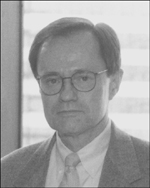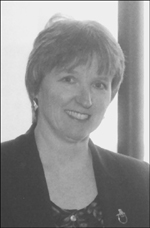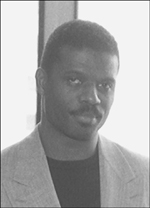Readers leafing through the San Francisco Chronicle last January perhaps had their eye caught by a headline on the opposite editorial page, the place where many newspapers these days offer opinions by outsiders.
The headline, over a short essay, read: “Another Victim in the Culture War.” The victim the author was identifying, however, was not an artist whom members of the public thought had gone too far. It was not a politician ousted from office for supporting an unpopular cause. It was the United Methodist Church.
The author of the essay was William McKinney, president of Pacific School of Religion in Berkeley, California, one of the nine seminaries of the Graduate Theological Union. In his piece McKinney warmly defended the role his school played in first supporting and then defending the decision of some eighty Bay Area United Methodist clergy to officiate at a service in Sacramento in which two United Methodist lay women exchanged vows of commitment to each other.
But McKinney, whose seminary he says has educated the majority of United Methodist clergy in northern California, also lamented the bitter divisions engendered by the struggle in the churches, and the United Methodist Church in particular, over whether active homosexuality is an acceptable and moral style of life. “In a time when we desperately need examples of ways people of diverse backgrounds and views can find common ground and work together, another social institution seems on the verge of schism,” he wrote.
The Pacific School of Religion pays close attention to its presence in the news media, which its leaders regard as part of the school’s teaching ministry. McKinney himself is a student of the sociology of religion. Two other members of the PSR faculty are bioethicists, who appear frequently in the media commenting on ethical questions related to genetic research. A stack of photocopies of 1997 and 1998 news stories in which the school figured runs to more than sixty pages.
Many other theological schools, perhaps most, leave a much shallower impress on the public consciousness, a recent survey by the Auburn Center in New York disclosed (See “Do Today’s Seminaries Have Public Roles?,” In Trust, Autumn 1999).
 |
| Robin W. Lovin, dean of Perkins School of Theology at Southern Methodist University, is co-director of the “Public Character of Theological Education” project.
Photographs by Alex Solmssen
|
Seminaries belonging to the Association of Theological Schools are currently halfway through a study of how they encounter the world—and the world encounters them. An interim report on the findings is to be made at the June biennial meeting of the ATS in Toronto. The study, funded by a Lilly Endowment grant of $800,000, is being guided by Robin W. Lovin, dean of Perkins School of Theology at Southern Methodist University in Dallas, Texas, and Richard J. Mouw, president of Fuller Theological Seminary, Pasadena, California.
Having noted that schools differ in their approaches to “public theology” depending on their circumstances and tradition, the surveyors arrayed seminaries in four groups: mainline, evangelical, Roman Catholic, and university-related. For Catholics, for example, the church’s primary public teacher is not the seminary but the bishop, explained the Reverend Jeremiah J. McCarthy, rector and president of St. John’s Seminary, Camarillo, California, who heads the Catholic schools section of the project. Nonetheless, Catholic seminaries have a crucial responsibility to assist and undergird their bishops in their teaching role and to prepare priests to function effectively as teachers of the public. The study of evangelical seminaries is being coordinated by David C. Jones, a faculty member of Covenant Theological Seminary, St. Louis, Missouri, and the work at university-related schools is in the hands of Richard Wood, dean of Yale Divinity School, New Haven, Connecticut.
 |
| Elizabeth Currier Nordbeck, dean of Andover Newton Theological School, chairs the project’s mainline schools study group. |
In charge of the survey of mainline schools is Elizabeth Currier Nordbeck, dean of Andover Newton Theological School, Newton Centre, Massachusetts. Presidents, deans, and faculty members of several mainline schools met recently near Washington to share experiences on their schools’ encounters with the public sphere. One participant, the Reverend Jeffrey L. Brown, Andover Newton Theological School graduate and pastor of Union Baptist Church in Cambridge, Massachusetts, told the group a striking story of how the public sphere had encountered him (See “I Took It as a Sign” below). Indeed, both Brown and others at the gathering suggested that the failure of some schools to interact effectively with the public resulted from a failure to deal with topics of concern to the public. Dean Snyder, communications officer for the United Methodists’ Baltimore Annual Conference, said, “It’s almost as if seminaries are trying to keep people out. People these days are interested in spooky stuff—the Middle Ages, Celts, druids, and so on, not dry rationalism.”
The survey report, when published, may offer schools guidance on possible strategies to meet their obligation under the ATS standards to engage their diverse publics. The report, explained Lovin, “will give the ATS and its visiting teams some models of how the public is engaged.”
 |
| The Reverend Jeffrey L Brown, is a graduate of Andover Newton Theological School and pastor of Union Baptist Church, Cambridge, Massachusetts. |
‘I Took It as a Sign’
by Jeffrey L. Brown
In January 1990 Jesse McKee and his friend Rigoberto Carion met up with some gang members as they walked home. They admired Jesse’s brand-new leather jacket, then killed him for it.
And they killed Rigoberto because he was a witness.
When Jesse died, he was about fifty yards from a church, but the church was closed. I took it as a sign. These kids were only a few years younger than I, but the gulf between us was vast. So, as an interpreter of public events, I figured I needed to figure out what was going on in their world. I volunteered at the high school and quickly found that those I needed to reach there weren’t there. They were hanging out on the streets.
In May 1992 Boston’s Morningstar Baptist Church held a wake for Robert Odum, killed when a drive-by’s stray bullet hit him. A kid came into the church from the street to pay his respects. The family knew he was in Robert’s music class. The gang across the street knew he belonged to a rival gang and they thought he was going in to disrespect the family. In their grief they chased after this kid and shot up the church. To his horror, my friend John Board, the pastor, found them stabbing this kid to death in front of the altar. That was a wake-up call for a lot of us. The message was: “If you don’t come out of the four walls of your sanctuaries and deal with us, then we’re going to start coming in with devastating consequences.”
A week later 350 ministers met to do something about the violence. There were eloquent speeches and people wanting to write epistles. Nobody wanted to talk to the youth and ask them what happened. No action was taken except to continue meeting.
A group of us decided to go out and find answers. That dispelled a lot of myths. I imagined a godless street, with youth and prostitutes and drug dealers who didn’t want to know anything about God. I’ve had some of my most profound theological conversations not at Andover Newton or at Harvard Divinity School, but in the street.
One example: We talked to a gang dealing drugs and eventually we got them to stop. During that time in which we were talking with them, a kid stood sentry at the door. He was one of the “hearts” of the gang, one of those who carries a weapon and is prepared to shoot if something goes down. He let us in and he let us out, but we never spoke. Except for once...
The heart grabbed my friend Bob Fisher, and took him off into the shadows. After several minutes they came back. As soon as we got around the corner, Bob told us what this cold-blooded killer had said: “Look, you don’t know me. You don’t know my name. You don’t know anything about me and I’m not going to tell you, but I’ve done some pretty bad things. I’ve been watching you guys and I think you can help me.” And then he said, “Of all of the things that I’ve done, I seem to have lost my conscience. Can you help me get my conscience back?”